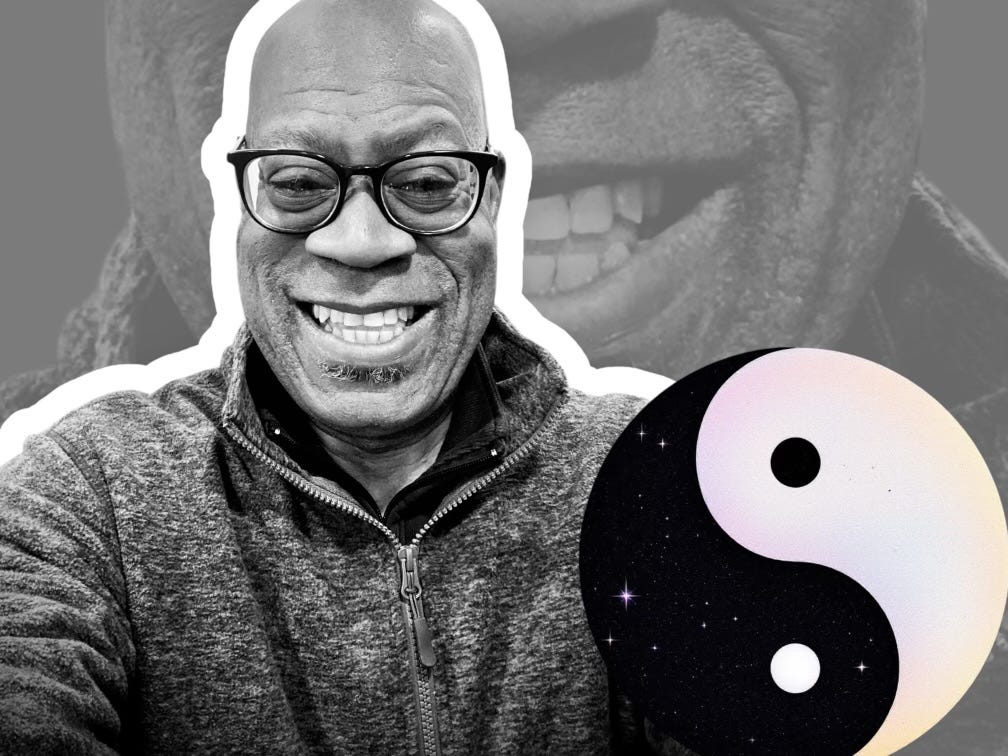Images created using PhotoRoom
There was a time when I was convinced that the pinnacle of my life would be earning a PhD and securing a position as a bougie intellectual at an Ivy League institution.
Graduate school and getting my Master’s at The University of San Francisco was intoxicating—the discourse, the rigor, the late-night debates over stuff that no one outside of academia cared about. It was a world of frisson, where the thrill of discovery and the chimera of ultimate knowledge danced together in a cerebral waltz.
So, I was ready to choreograph my mind into the shape of an erudite scholar, someone who lived among the clouds of thought.
And then my ex-wife talked me out of it.
She, in her own incisive way, cut through the grandiosity of my plans with a simple truth:
Do you really want to live in your head for the rest of your life?
At the time, I bristled at the question. But looking back, I’m glad she challenged me. Because what I had mistaken for intellectual ambition was, in many ways, an elaborate coping mechanism—an addiction to overthinking, a desperate attempt to control life through the power of reason.
The Mind as a Problem Factory
An overthinking mind is like a washing machine stuck on the spin cycle. It takes in one problem, churns it around, and spits out ten more. The human mind, left unchecked, will always create problems so that it has something to fix.
This is the great paradox of intelligence: the more we think, the more problems we find. We become like a mechanic endlessly tinkering with a car that was never broken to begin with.
In my case, I started to see how my own mental gymnastics had turned into a performance with no audience. I would analyze and reanalyze decisions, question motives, decode conversations, and then spend sleep interrupted nights dissecting the dissection.
It was a slow spiral into insomnia, as if my brain had become a bureaucratic machine issuing endless memos that no one needed to read.
From a Taoist perspective, this is the folly of excessive yang energy—too much action, too much heat, too much mental agitation.
The I Ching offers wisdom here, particularly Hexagram 52, Gen, the Mountain. It speaks of stillness, of quieting the restless mind, of allowing thoughts to dissipate like mist burning away in the morning sun. The hexagram warns that movement and overexertion of the intellect lead to imbalance, while true wisdom is found in stillness.
Hitting the Cancel Button on Thought
The Western tradition has long exalted the mind as the supreme faculty. But the East offers a different path—one that doesn’t worship thought, but rather sees it as one aspect of our being that must be harmonized with breath and presence.
Zhuangzi, the great Taoist sage, tells a story of a butcher who cuts meat with such precision that his knife never goes dull.
His secret?
He doesn’t hack away at the bones. Instead, he follows the empty spaces, moving effortlessly with the natural flow. This is how we should handle our minds—not hacking away at our thoughts, but learning to let them pass through, ungrasped.
One of the simplest yet most profound tools to stop overthinking is to hit the mental “cancel” button. When you notice your thoughts spiraling into analysis paralysis, simply say—internally or out loud—Cancel. Then, bring your attention back to your breath.
This is not a suppression of thought but a recalibration. It is a reminder that the mind is not the master. The breath is older than thought. The body is wiser than the intellect. By grounding yourself in the present moment, you cut through the endless loops of speculation and worry.
The Liberation of Not-Knowing
One of the greatest gifts I’ve received from Taoist wisdom is the ability to embrace not-knowing. The need to analyze, to plan, to intellectually dominate every situation is born out of fear—the fear of uncertainty, of failure, of impermanence.
But the Tao teaches that true wisdom is found in surrender, in yielding to the currents of life rather than resisting them.
Overthinking is, at its core, an attempt to impose structure on the unstructured, to impose certainty on the uncertain. It is a refusal to trust in the unfolding of life. But as the I Ching reminds us in Hexagram 29, Kan, the Abysmal Water, sometimes the only way to survive the river’s current is to flow with it.
And so, I’ve learned to let go. I no longer need to choreograph my thoughts into an airtight argument before taking action. I no longer need to solve imaginary problems just to give my mind something to do. I have surrendered to the knowledge that I will never be able to think my way into a perfect life.
My Final Thought—Or No Thought at All
The next time you catch yourself overthinking, try this:
1. Say Cancel.
2. Breathe deeply into your belly.
3. Let go of the belief that thinking more will bring clarity.
Some of life’s most profound answers do not arrive through analysis, but through silence. True wisdom is not found in mental acrobatics but in the stillness beneath thought.
It is there, in that space of presence, that life reveals itself—not as a puzzle to be solved, but as a river to be floated down, without resistance, without fear, and without the exhausting weight of an overactive mind.
It goes without saying that we’re facing some tough days ahead. So if you find my nomadic wisdom valuable in helping to set a positive tone for your day, please join me as a paid member supporter at only $6.00/month or $60.00/year.
Or feel free to tip me some dirty chai latte love here if you feel so inclined.
Every bit counts as I strive to deliver high quality feature articles into your inbox on a daily basis. Never any paywalls, just my Taoist raw thoughts which are open to everyone on what it means to be human.
Your contributions are appreciated in support of my full time work and calling.
Much Love, ❤️







Very nice strategies, Diamond-Michael. I see those highly-yang energies in my spouse, too, and in myself. I've spent the second half of my life unlearning those ways. Thank you for your guidance.
Deeply grateful for this. I have always had very little control over the external things in my life (disability, poverty, my environment) and, for a long time, I thought thinking was the answer - that was how I would reclaim my power, by thinking. There is a strong narrative in society that when life is tough, you 'win' by exerting your own will on things - by fighting. I definitely equated that with thinking more and more and more. I'm 43 and only just beginning to recognise how much damage this has done to me.